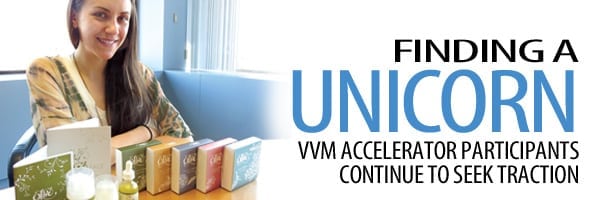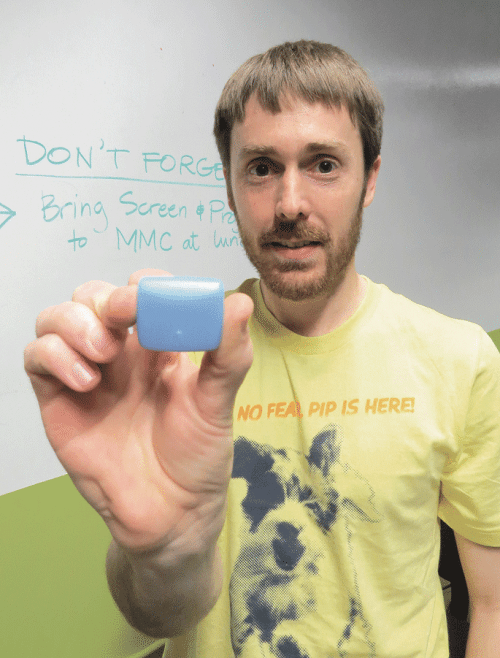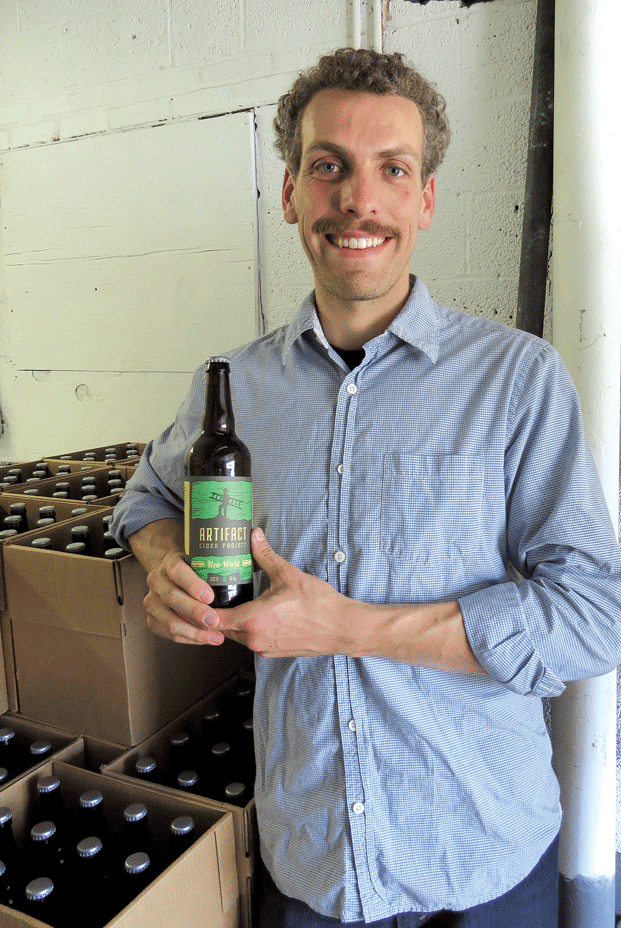
Finding a Unicorn
VVM Accelerator Participants Continue the Quest for Traction
Traction.Webster has many definitions for that noun, including ‘the adhesive friction of a body on the surface on which it moves’ — and that’s why it’s used frequently, and often with accompanying adjectives, by companies selling tires.
That’s also, although more loosely, why it’s part of the lexicon among those who launch new businesses — and, perhaps more importantly, those who sometimes help finance them.
Indeed, traction is a precious and often hard-to-calculate commodity in business. It is an inexact measure of how effectively a product or service is gaining acceptance, credibility, and, yes, sales.
So, in many ways, the first annual Accelerator Awards, staged recently by Valley Venture Mentors, represented a highly competitive contest of traction — which of the 30 companies in the first cohort of VVM’s Accelerator Program had it, and which ones could gain a lot more of it if they had some more capital to work with.
If the numbers written on the ceremonial checks handed out at the awards ceremony on April 30 are any indication — and most involved would say they are — then Jessica Lauren has certainly achieved some traction with Olive Natural Beauty Inc.
This is a venture that boasts a growing line of products that, as the name suggests, uses olive oil as its base ingredient, but separates itself from others that do the same by the all-natural quality of every item on the ingredient list.
Lauren won a check for $35,000, the largest amount handed out that night by a panel of judges, each of whom had, in essence, $20,000 to apportion and were free to dispense it any way they chose. Lauren intends to stretch those dollars about as far as humanly possible, allocating them for everything from more aggressive marketing programs to building inventory to taking on a strategic partner, as she seeks to take her company to the proverbial next stage.
“It costs money to run a business, and anything would really help push us to the next level,” she said, adding quickly that the amount on her check constitutes far more than ‘anything.’ “This is going to be huge for us.”
For this issue and its focus on entrepreneurship, BusinessWest talked at length with Lauren and others from that first cohort who successfully communicated a level of traction for their businesses to both their peers and those aforementioned judges.
Dave Waymouth, for example, took home a $32,500 check to advance his veture, PetSimpl, which markets a device — one he believes is a vast improvement over anything currently available — that can help pet owners keep track of their furry loved ones.
Lightspeed Manufacturing in Haverhill is now producing the so-called Pip, named after Waymouth’s terrier mix, which in many ways inspired this business (more on that story later).
Waymouth is taking orders, and he expects his product to officially hit the market this summer and be in several outlets in time for the holidays.
Meanwhile, Jake Mazar and his partner, Soham Bhatt, hit their highly competitive market with Artifact Cider roughly a year ago. They now have their product in 40 liquor stores and eight bars along the I-91 corridor, and intend to use the $20,000 they won to help pay for a part-time salesperson to increase their cider’s reach and strengthen its brand.
The accelerator project’s first cohort has 27 more stories like these. They are all different, but there are many common denominators, especially that quest for traction.
Getting a Grip
‘I love you guys, but … no way.’
That’s one of the qualitative assessments used in conjunction with actual numbers (1-9) on the score sheets employed by so-called ‘herds’ within that first accelerator cohort as the entrepreneurs judged their peers and fellow competitors in one of the early phases of the process that decided who received checks on April and how big they were.

Dave Waymouth says his ‘Pip’ device, which helps pet owners find lost loved ones, is a vast improvement over what currently exists on the market.
Other assessments, used far more often, included ‘weak story and not enough customer validation,’ ‘somewhat agree/you got me onto the right side of the fence,’ ‘believable story but not enough customer validation,’ and ‘a rare unicorn of perfection,’ which would constitute a ‘9.’
The unicorn has become the unofficial symbol of VVM, and it was on display prominently at the awards ceremony. It represents an ambitious goal, something rare, but also (at least in the VVM universe) something real.
Finding a unicorn is the unstated mission of all the entrepreneurs involved with the accelerator program, said Silva, noting that these individuals went through a rugged period of learning and assessment designed to provide tough love, mentoring, and, for several ventures, very-much-needed cold, hard cash.
Those aforementioned herds were comprised of five entrepreneurs each, and the herds did not judge those in their own group, said Silva, adding that they gathered scores to six questions (statements, actually) — ranging from ‘the company has proven, in-depth understanding of their customers and the customers’ pains’ to ‘the company has a proven revenue model, logical pricing, and has an accurate handle on all applicable costs; they know what can kill them!’ — to effectively narrow the field to 12 finalists.
This smaller field was then assessed by the group of 14 judges, who are also investors, who heard 10-minute presentations from the finalists and then could follow up with more questions and input during a trade-show period before the awards presentation.
Lauren obviously impressed those judges, with both what she’s accomplished to date and the potential to soar much higher.
Like the others we spoke with, Lauren said her venture was born through a mix of necessity and both experience with other products on the market and frustration with them.
“Growing up in an Italian family, olive oil was an important part of our lifestyle in terms of being healthy and taking care of yourself and your skin,” she explained. “And when I went to college, I went to work for an apothecary, and that experience really opened my eyes to the cosmetics industry in the U.S., because there are literally no regulations — there are tons of ingredients that go into cosmetic products that are not regulated or tested or approved by the FDA or any other organization.”
What evolved over time, then, was a business focused on the many beneficial properties of olive oil and featuring the transparency and natural ingredients missing from most products made in the U.S.
She started with a lab in her kitchen, testing various products and providing them to friends and relatives, who started asking for more. And, as she said herself, “the rest is history.”
Explaining in more detail, she said olive oil has become, in many respects, a gourmet product. She is riding that wave, certainly, but in a unique way.
Her products have achieved traction in a number of ways, she said, noting that she’s sold more than 400,000 units to date (like a true entrepreneur, she got more precise, offering the number 404,000). The products are sold through 30 retailers in the U.S. and Canada, and Lauren is in serious negotiations with a major chain she opted not to name that will greatly improve that number if all goes well.
Perhaps most importantly, she’s getting some solid reviews, which are crucial because of the sheer volume of competition.
For example, Michelle Phan, founder of the website ipsy.com, which helps consumers wade through the myriad products on the market through reviews and recommendations, tried some of Lauren’s lip balm and discussed it glowingly in one of her online videos.
As part of that PR and marketing push toward which Lauren wants to direct some of her winnings, she’s striving to win some exposure in People, Good Housekeeping, and other publications with a strong focus on health and beauty and that feature companies making such products.
If all goes as planned — and she expects it will — sales volume, currently around $250,000, should eclipse $1 million in 2016.
A Breed Apart
Waymouth said Pip, his terrier mix, went missing early one evening a few years ago. As anyone who’s been through such an ordeal would understand, this was quite a traumatic experience.
“We live near busy roads, and he sees every car as something with a friend in it,” he explained, adding that, fortunately, the dog was found just a few hours later.
But the experience left Waymouth frustrated by the pet-protection products available on the market — and determined to build the proverbial better mousetrap. He calls it a “LoJack for your pet,” a reference to the vehicle-tracking system designed to help police recover stolen vehicles.
“I’m a big tech guy, so I assumed there were GPS trackers that did this,” he said of his thought process after Pip — now the company’s ‘spokesdog’ and the face of the venture, pictured on the business cards and website — was found safe. “But when I looked, everything was too big for him, or it had horrible battery life.”
At the time, he was enrolled in the MBA program at the Isenberg School of Management at UMass Amherst, and decided to enter a business-pitch competition and make his case for a more effective product. He finished third in that contest and then went through several more rounds where he flushed out the business model and came up with a way to make the product smaller and with longer battery life.
He eventually prevailed in the extended competition, winning a total of $30,000 to build a prototype. He was then accepted into MassChallenge, which helped create connections to Verizon and other strategic partners and make the concept reality.
The Pip uses mostly the same cutting-edge technology found in a smartphone to send a text message to the pet owner when the animal in question leaves a so-called ‘safe zone’ — the owner’s home and area around it, as well as a several-foot-wide area around the pet while it’s being taken for a walk, for example. With the press of a button, the owner gets turn-by-turn directions to locate the animal. When the pet is in that safe zone, the device stays in a low-power mode, Waymouth explained, thus greatly extending battery life.
The first manufacturing run will be for 1,000 of the devices, he said, adding that many orders came in through a Kickstarter campaign, and others continue to trickle in through the website. That will be followed by a run of 5,000 and perhaps another of that size if demand warrants.
The Pip will soon be available on Amazon, and Waymouth is expecting that it will become an in-demand item for the upcoming holiday season. The current sticker price is $99, with a $5 month charge for the cellular connection, or $199 for the ‘unlimited option.’ Over time, and as the technology improves, he expects those price points to come down.
While getting ready for the Christmas season, Waymouth is also in hard pursuit of capital for the venture, and is finding many interested parties.
“I’ve gotten more interest than I can really deal with, which is a great problem to have,” he explained, noting that negotiations continue on a first round of financing he expects will approach or exceed $500,000.
One of those interested parties is the Springfield Venture Fund, he said, adding that its participation will require him to move his headquarters from Northampton to Springfield (that’s one of the conditions of the fund, backed by MassMutual). Either way, the company fully expects to stay within the 413 area code.
“We’re planning on staying in this region,” he said. “We want to be a Western Mass. success story.”
Core Business
Those same sentiments were echoed by Mazar, who said his aptly named product is fast gaining that all-important traction in this area.
Elaborating, he gave a rather loose definition of an ‘artifact’ as something created by man, and from another era, that’s been discovered or rediscovered. Hard cider, he went on, was a popular and potent potable in New England a few centuries ago, primarily because the soil here was more suitable for growing apples than it was for cultivating the hops needed for beer.

Dave Mazar says Artifact Cider is establishing itself within the fastest-growing segment of the alcoholic-beverage market.
The Artifact Cider Project, as it’s formally known, is part of the wave, said Mazar, but the product differentiates itself in what is now the fastest-growing segment of the liquor market by the way it’s made — with local apples and unique blends.
The story begins, sort of, several years ago, when Mazar was diagnosed with celiac disease, an autoimmune disease of the small intestine caused by a reaction to gluten, which is found in wheat and similar crops, including hops.
“I couldn’t have beer, so, prompted by that diagnosis, I discovered cider,” he said, adding that this interest was shared by Bhatt, a friend since middle school whose aptitude in science, engineering, and culinary arts has effectively complemented Mazar’s background in business — he was a consultant for several years — and, most recently, farming.
“Local agriculture is my passion in life, so Artifact is a combination of our respective professional backgrounds,” he noted, adding that the venture was launched on a virtual shoestring in 2013, and the first cider was introduced in June 2014.
Today, the company has three brands, or blends: ‘New World,’ the first product; ‘Wild Thing,’ described as a “supremely tart, sessionable” cider; and ‘Colrain,’ named after the Franklin County town where the apples used to make it grow.
They come in kegs and 22-ounce bottles, or “bombers,” said Mazar, adding that the obvious goal moving forward is to sell more of them, and the $20,000 won through the accelerator program will certainly help with that assignment.
“One of the things we want to do with the money we received through Valley Venture Mentors is hire a part-time salesperson to help build the brand,” he explained. “We’re mostly focused on our existing accounts; we’re not trying to grow too quickly.
“Eventually, we’d like to get our cider into Eastern Mass. and Boston, but we’re really focused on the Pioneer Valley as our home base,” Mazar went on. “We want to be successful here before we expand too broadly.”
Two marketing interns, one from Smith College, the other from Mount Holyoke, will be working for the company this summer, he noted, adding that they’ll be handling, among other things, cider tastings and other events to introduce or reintroduce people to cider and the Artifact label.
Money Talks
Speaking for all those who took home ceremonial checks from VVM, Mazar said the money comes at an important time and provides needed fuel as the company looks to grow its brand.
“We’re a small company, so getting capital at this stage is going to change things quite a bit for us,” he noted. “We really bootstrapped this company — we started it with our own personal finances, and we’ve done everything on the cheap. We’ve made the money we started with go quite a long way.”
Such is life for the startup business owner looking to take an idea from drawing board to reality — and gain that precious commodity called traction.
The companies in this first cohort all have some of it. The challenge — and the mission — is to earn more.
George O’Brien can be reached at [email protected]







